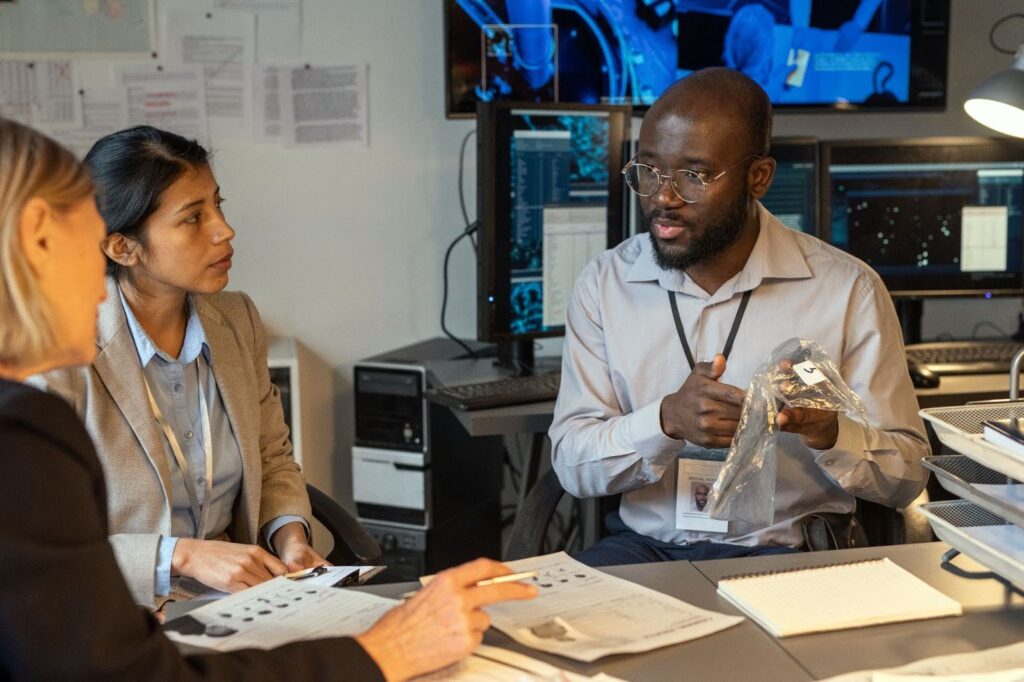While technical expertise and field experience are essential in homeland security, professional success also depends on strong relationships. In a field shaped by collaboration and constant change, the ability to share knowledge, seek guidance, and build trust can open doors to new opportunities.
For students enrolled in the online Master of Arts in Homeland Security and Emergency Preparedness (HSEP) from Virginia Commonwealth University (VCU), networking is an integral part of the experience. The program fosters lasting connections among students, faculty, and alumni that often extend well beyond graduation.
Building Connections in the Classroom
VCU’s online HSEP program limits class sizes to encourage genuine discussion and collaboration. Through live sessions, breakout groups, and team projects modeled on real-world challenges, students share experiences and build trust.
“The learning platforms and course design are really unsurpassed in terms of sparking student engagement and discussion,” said current student Darshan Parikh, deputy emergency management coordinator, Chesterfield County. “The engagement and connection that you have with students—all of whom will be peers in your profession—is very high. Not a week goes by that I don’t talk with a few of the graduates from my program by text. It’s great to know that if I need a favor or to ask advice, I have people that I can talk to.”
These classroom connections often evolve into lasting professional relationships, creating a network that spans agencies, sectors, and years of service.
Learn From Faculty With Real Homeland Security Experience
Build Relationships That Link You Directly to the Profession
Faculty as Gateways to the Field
A key strength of VCU’s HSEP program is the L. Douglas Wilder School of Government and Public Affairs faculty, experts with direct experience in homeland security, intelligence, and emergency response at the federal, state, and local levels. Their backgrounds inform their teaching, enabling students to bridge theory and practice while gaining mentorship and access to professional networks in areas such as cybersecurity, counterterrorism, and disaster response.
Maureen Moslow-Benway, Ph.D., a former special agent with the Air Force Office of Special Investigations, teaches courses on terrorism, counterterrorism, the U.S. intelligence community, and the intelligence process. Recognized as the Department of Defense’s Counterintelligence Agent of the Year, she offers students practical insight into national security operations.
David Webber, Ph.D., focuses his research on radicalization and deradicalization, with support from agencies including the Department of Defense. He teaches courses on terrorism and emergency preparedness, integrating research presented to organizations like the U.S. State Department and the Anti-Defamation League.
Retired supervisory intelligence analyst with the FBI’s Targeting and Data Exploitation Unit (TDEX) Laurence Prokop brings five decades of experience in intelligence, national security, and criminal justice to his teaching. Prokop’s résumé includes 20+ years of service as a cryptologist and linguist for the U.S. Navy; throughout his career, he has taught numerous post-secondary level courses on criminal justice, intelligence, and counterintelligence.
“The faculty are amazing here,” said current student Kabrina Tippet, occupational safety specialist. “All of my professors have gone above and beyond in supporting and encouraging me. And those relationships don’t end when a class ends; I get regular emails from faculty I met in my first semester here about opportunities for the future. That’s special.”
Leveraging Alumni and Wilder School Networks
As the first homeland security and emergency preparedness program of its kind in the nation, VCU’s HSEP program has built a broad and active alumni network across public, private, and nonprofit sectors. Nearly 80 percent of alumni live in Virginia, Maryland, and Washington, D.C., placing students in proximity to one of the nation’s most influential regions for policy and emergency management.
This network connects students with mentors and job leads. Beyond alumni ties, the Wilder School community provides additional support through career resources, networking events, and faculty connections that often extend past graduation.
“This program is excellent for students who want to [develop] a broad array of skills and connections,” said Parikh. “I would encourage prospective students to prioritize making connections with one another as highly as they prioritize good grades because fostering connections within emergency management is particularly important.”
Proximity and Access to Policymakers
VCU’s location in Richmond provides more than geographic convenience. Just 90 minutes from Washington, D.C., VCU offers students proximity to the heart of national homeland security and emergency management activity. This access to internships and industry experts enables students to apply classroom knowledge in real-world settings. These experiences deepen understanding of government and public policy while helping students build professional networks that support long-term career growth.
Actionable Networking Strategies for Students
HSEP students can expand their professional networks through intentional engagement both inside and outside the classroom by:
- Participating actively in class discussions to build credibility with faculty and peers
- Approaching group projects as opportunities to form lasting professional relationships
- Joining relevant professional associations in fields such as emergency management, cybersecurity, and public safety
- Networking with VCU faculty
- Attending Wilder School webinars and events, featuring practitioners and policymakers
- Applying for the Wilder Graduate Scholars Fellowship, which offers mentorship, field experience with a Richmond-area employer, a stipend, and in-state tuition
- Staying connected after graduation through alumni networks, regional meetups, and online platforms
These strategies help students build meaningful connections and increase their visibility in the homeland security and emergency preparedness field.
Next Steps: Put Your Career Network in Motion
Networking is more than a social skill; it’s a lasting professional asset. For students in VCU’s online Master of Arts in Homeland Security and Emergency Preparedness program, that process begins at enrollment. With small class sizes, experienced faculty, a strong alumni network, and proximity to Washington, D.C., students gain the relationships and insights needed to grow in the field.
To learn more about how the program can support your professional goals, schedule a program overview or begin your application today.
